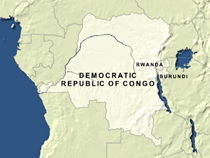2007年VOA标准英语-Rwanda, Burundi, DRC Re-Launch Regional Bloc(在线收听)
Nairobi
18 April 2007
Countries of the Great Lakes region of central Africa have resurrected a former political and economic alliance so they can cooperate on a number of initiatives. Cathy Majtenyi reports for VOA from Nairobi.
The Economic Community for the Great Lakes Region was first created in 1976 to promote the free movement of goods and people amongst the Great Lakes nations of Rwanda, Burundi, and the Democratic Republic of Congo.

Democratic Republic of Congo, Rwanda, Burundi
The arrangement lasted a little less than 20 years before it collapsed due to brutal civil wars in the region.
This week in Burundi's capital, Bujumbura, the foreign ministers of the three countries re-launched the bloc, pledging to work together to bring peace and stability to the volatile area.
Rwandan presidential adviser Richard Sezibera tells VOA the Economic Community for the Great Lakes Region, CEPGL, is an important step for the three countries that were in open conflict barely a few years ago. Sezibera says it will have programs in several priority areas: peace, security and good governance, agriculture, energy, infrastructure, education and research, and investments.
"We will now be talking about cooperating in alleviating poverty and encouraging development of the three countries," he said. "It is an important step, not only for the three countries but hopefully, if we can get the CEPGL to work well, then it will be a model for the rest of the countries in Africa that are emerging from conflict."
For more than a decade, the Great Lakes countries have been embroiled in internal and cross-border warfare.
Burundi is just emerging from a civil war that broke out in 1993 after the Tutsi-dominated army assassinated the country's first democratically elected president, who was a Hutu. That conflict claimed about 300,000 lives.
An estimated 800,000 mostly Tutsis and moderate Hutus were slaughtered during Rwanda's 1994 genocide. Many of the Hutu extremists responsible for the mass murder fled into the Democratic Republic of Congo.
Periodic forays into DRC by the Rwandan army to hunt down the Hutu extremists have caused strife between the two countries.
A number of brutal rebel groups operating in DRC have caused havoc in that country throughout the years and have also crossed over into Burundi to slaughter Congolese refugees living in Burundi.
Rwandan presidential adviser Sezibera says, despite the chaos, the three countries had managed to continue some programs set up under the old bloc, including an energy program that sees Rwanda getting power from DRC and a common travel document for the Great Lakes region.
He says Belgium and the European Union supported the re-launch and contributed resources to the community.
The Economic Community for the Great Lakes Region has three major institutions: the Economic and Development Bank of the Great Lakes countries, headquartered in DRC; the Energy of Great Lakes, also based in DRC; and the Institute of Agricultural Research and Zoology, located in Burundi.